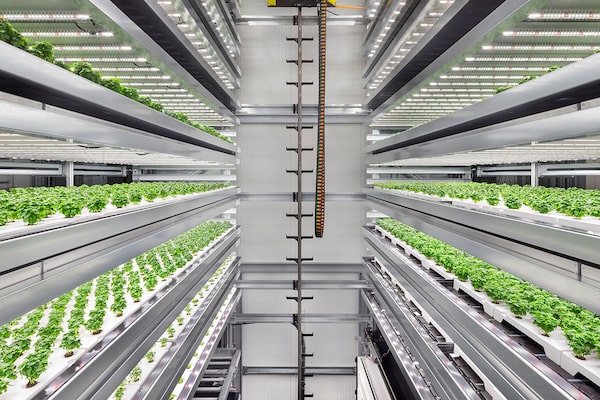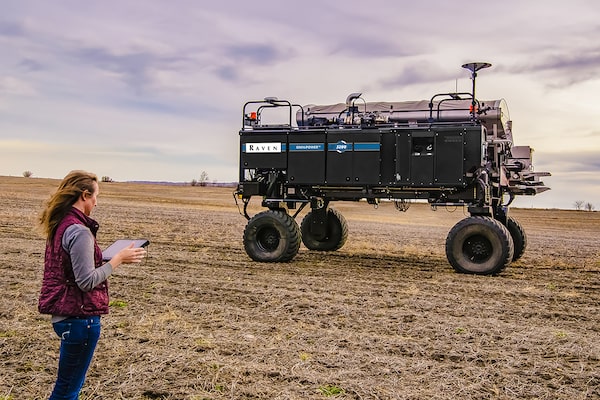
Last year, German-based Infarm secured a deal to provide Sobeys stores with produce from its hydroponic vertical farms. It's building cutting edge facilities in Hamilton and Calgary, which will lead to new jobs—and fewer emissions.Infarm
You might not think of the industrial zone around Hamilton’s John C. Munro International Airport or Calgary’s International Airport as prime farmland. But that’s where German company Infarm is building what it hopes is the next big thing in agriculture: indoor, vertical farms.
The cavernous hall will feature a series of tiered, 10-metre-tall plant incubators, each capable of churning out a football field worth of fruits and vegetables a year.
“With our vertical farming approach, we can protect the environment in the sense that we use a fraction of the land, water and supply chains traditionally involved in food systems,” says Steve Martin, Infarm’s regional director of operations for North America.
Infarm is part of a wave of foreign companies aiming to revolutionize agriculture in Canada. These firms, many working with local partners, are investing heavily in cutting-edge technology, from self-driving tractors to eco-friendly biofuels. Those kinds of advances will be vital to helping Canada — and the world — feed itself as farmers grapple with climate change, worker shortages and dwindling natural resources in the years to come, industry players say.
“We’re solving global problems,” says Marco Coppola, business excellence manager at Raven Industries, a U.S.-based maker of autonomous farm equipment. “You can draw some very direct parallels between the challenges facing a customer in Canada and the challenges facing a customer in a place like Australia.”
Since the 1950s, the use of synthetic fertilizers and high-yield crops has led to a Green Revolution in farming that led to significantly higher crop yields, which in turn supported a tripling of the world’s population. But agriculture’s expansion has taken a heavy toll on the environment. The hunger for farmland has led to deforestation, and the overuse of chemical fertilizers has polluted rivers and oceans. The United Nations Environment Programme estimates that humanity’s food production systems are pushing 24,000 plant and animal species toward extinction. They’re also responsible for some 30 per cent of human-made greenhouse gas emissions, making them one of the biggest drivers of climate change.
Infarm is part of a wave of foreign companies aiming to revolutionize agriculture in Canada. These firms, many working with local partners, are investing heavily in cutting-edge technology, from self-driving tractors to eco-friendly biofuels.
Demand for food is expected to grow by 60 per cent by 2050, which is why the agricultural sector is looking to technology to boost yields and lighten agriculture’s environmental footprint.
It’s the raison d’ être of Infarm, which was founded in 2013 in Berlin. The company uses a hydroponic system to produce chemical-free fare that can be grown in urban areas, reducing the greenhouse gas emissions that are produced when food is hauled across continents. Crops grow on trays in tall, climate-controlled containers. Sensors monitor humidity, light, temperature and other factors in each container, automatically sending notifications when a crop is ready to be harvested—and using machine learning to improve its plant-specific algorithms. As a result, Infarm’s operations also use 95-per-cent less land and 95-per-cent less water than traditional farms, Martin says.

Agtech companies in Canada say foreign direct investment allows them to scale their businesses and expand internationally.Raven Industries
The company has production hubs in Vancouver and Halifax along with the Hamilton and Calgary facilities. In 2021, the company inked a deal to supply produce to 1,000 Sobeys stores, a deal that will only be good for job creation in the agrifood sector.
“The feedback we received in Canada is very positive,” Martin says. “Our market research shows that Canadian customers prefer to shop for locally grown brands.”
The Information and Communication Technology Council, an Ontario-based think tank focused on the digital economy, estimates there are more than 250 agricultural technology companies in Canada, the vast majority homegrown smaller businesses. Those firms specialize in everything from lab-grown meat to new-age fertilizers to robotic farm equipment.
While many are breaking new ground, founders often face an uphill battle when trying to scale their businesses and expand internationally. That’s why foreign investment is often key, Raven Industries’ Coppola says.
“Some of these larger foreign companies are operating on a global scale and they bring to the table not just their experience, but also a distribution network that opens up completely new markets for our products.”
In 2020, Raven purchased Saskatchewan-based DOT Technologies and set up a Canadian headquarters in Emerald Park, Sask., just outside of Regina.
The company specializes in what’s known as precision agriculture, including guidance systems, application controls, and most recently, autonomous farm vehicles. That technology is expected to be a lifeline for Canadian farmers who are facing a looming labour shortage: one prominent study has estimated that by 2025, there will be 114,000 unfilled farming jobs in Canada.
That’s in addition to other stressors, including climate change, water scarcity and extreme weather, such as floods. When asked if those pressures have transformed agricultural technology from a nice-to-have to a must-have, Coppola doesn’t hesitate.
“Absolutely. That goes without saying.”
Advertising feature produced by Globe Content Studio with Invest in Canada. The Globe’s editorial department was not involved.